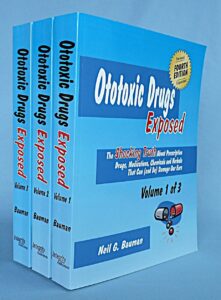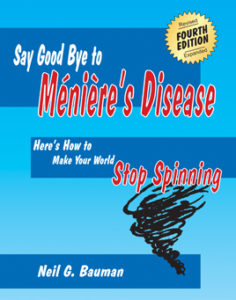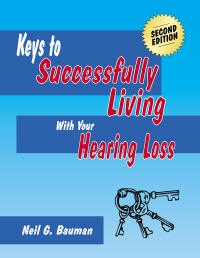by Neil Bauman, Ph.D.
Each year more and more people are damaging their ears from taking ototoxic drugs. Why? Simply this. People are taking more and more drugs, and the law of averages says that the more you take, the greater your chances of having adverse side effects.
Dr. John Abramson of Harvard Medical School, when asked, “Are most Americans overmedicated?” replied, “They sure are!” He further explained, “It is no secret that Americans take many drugs unnecessarily, and when drugs are needed, people often take the wrong ones.”
So who’s to blame—patients? doctors? or the drug industry? They all are! Here’s why.
People: People want the magic pill that instantly gets rid of their physical problems, so they buy into the idea of “A pill for every ill” and “A drug for every bug.” They don’t want to change their lifestyle, eating habits or exercise habits in order to get (and stay) well.
Doctors: Most doctors prescribe drugs because they think it’s in their patients’ best interest. Why? Because that is what they have been taught to believe. Where did they get this idea? From the drug companies, of course. Doctors need to quite believing everything the drug companies tell them and look into all the different methods for healing people apart from drugs.
Drug Companies: Drug companies are in the business of making money, and they have found a cash cow that is making them billions of dollars. Here’s what’s happening. There have been radical changes in the way that our medical knowledge is provided. Bottom Line Secrets (April 27, 2007) in their article “Are You Taking Too Many Medications” made this revealing statement:
Before 1980, most clinical research was publicly funded, but now most is funded directly by the drug and other medical industries, whose primary mission is to maximize the return on investments for investors [and thus not to cure people’s illnesses—or they wouldn’t need their drugs any more]. Remember, drug ads that tell you to “ask your doctor” about a particular drug have a single purpose—to sell more drugs, not to improve your health.
Ninety percent of clinical trials now are commercially funded—as well as 75% of published clinical research. [I think these figures, while shocking, are still much too conservative.] When a pharmaceutical company sponsors a study, the odds are five times greater that the findings will favor its product.
Furthermore, this article explains:
Drug and medical industries fund 70% of continuing education lectures and seminars, which are among the activities that doctors are required to attend to maintain their licenses to practice. Wherever doctors turn for sources of information, drug companies dominate.
Did you catch that? The doctors primary source of information is ultimately from the drug companies, and the drug companies are in the business of making money for their investors.
So where does that leave us? If we want to get healthy, we need to do our homework before we decide whether to take a drug for a given condition, or whether we should look for some alternate solution that is not harmful to our ears (and the rest of our bodies too).
The above Board Room Secrets article then continues:
Are natural therapies a better alternative to some drugs? If you look at the data rather than listen to the drug ads, you see that natural alternatives, such as improved diet and routine exercise, often are far more effective than drugs at achieving real health improvements, such as less heart disease and longer life.
Here comes the kicker.
Many patients prefer pills because they’re easier. [In other words, we are lazy when it comes to protecting our health.] There is no question that many of us would rather take a pill than change our lifestyle. If the pills worked, it would simply be a question of how we want to spend our money. The problem is that the “magic” of the pills often is empowered by our cultural beliefs, but without a genuine scientific basis. About two-thirds of our health is determined by the way we live our lives, and—for better or worse—no pills can change that.
So instead of worrying whether a certain drug is ototoxic or not, you should be questioning whether that drug is really necessary in the first place or not, and be actively looking for better alternatives. For example, see the June 12, 2007 article “Addicted to Nasal Drugs” to see one way this can work out in practice.)
Reference: Bottom Line Secrets April 27, 2007 “Are You Taking Too Many Medications?”


